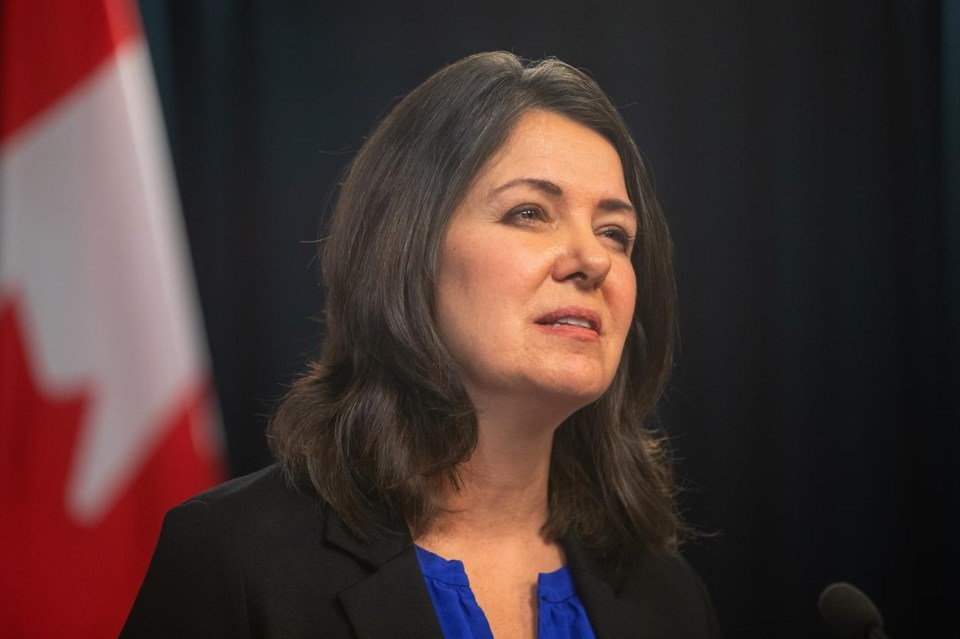EDMONTON — Alberta’s Opposition NDP says the first sitting under Premier Danielle Smith was a short, chaotic mess with the passage of a sovereignty act that dooms the province to confusion over who follows which laws.
NDP house leader Christina Gray said the government passed the bill in just over a week by cutting off debate time in order to get it out of the spotlight before critics and affected parties could further assess it.
“People had virtually no opportunity to consider how they had changed the bill in response to all of the criticisms,” Gray said at a news conference Friday.
“Danielle Smith, upon hearing all of the criticisms, just shut down debate and ran away.”
Government house leader Joseph Schow was not made available for comment. Instead, he issued a statement saying the government delivered on priorities during the sitting, particularly on inflation fighting.
On the sovereignty act, Schow wrote, "amendments to Alberta’s sovereignty legislation passed in this session protect our democracy as well as provincial rights and the Canadian union."
The Alberta Sovereignty Within a United Canada Act, Smith’s signature legislation, was given royal assent by Lt.-Gov. Salma Lakhani as the house rose Thursday following a three-week sitting.
Smith had promised to pass the sovereignty bill, saying it is needed to push back on what Alberta believes is unconstitutional federal encroachment on provincial jurisdiction.
But the rollout was fraught with confusion and condemnation from the moment Smith introduced it in the house on Nov. 29, particularly the provision that granted the premier and her cabinet sweeping power to rewrite laws free of legislature input or oversight.
Smith initially rejected accusations the bill contained such a clause. Days later, she said the bill would be amended to ensure it didn’t say that, adding it was never meant to be in there in the first place, while declining to explain how it got there.
The premier compounded the controversy when, in speaking to the bill just before it passed, she dismissed the constitutional authority of the federal government, saying “It’s not like Ottawa is a national government.”
Opposition NDP Leader Rachel Notley said that comment let slip the veil that while Smith says she does not want to pursue Alberta separation, the legislation is designed to pick fights with Ottawa and lay the groundwork for such a move.
Legal experts say the bill remains problematic as it gives cabinet the power to compel public entities to flout federal laws. The bill also grants the legislature, rather than the courts, authority to decide what is and is not constitutional.
Alberta’s First Nations chiefs renewed calls for the bill to be scrapped, given the failure of Smith's government to consult with them on it amid concerns it tramples on treaty rights.
As pushback from the chiefs mounted, Smith was criticized this week for equating Alberta’s plight with Ottawa to that of the historic abuse Indigenous Peoples experienced with the Canadian government.
Smith later said she didn’t mean it that way and was sorry if anyone took it to suggest she was minimizing the Indigenous experience in Canada.
Political scientist Duane Bratt said regardless of opinions on the sovereignty act, Smith followed through on her promise to get it done.
“Smith campaigned on this. She said she would do it and they rammed it through,” said Bratt, with Mount Royal University in Calgary.
The house resumes sitting in February ahead of the scheduled May 29 general election.
Polls suggest Smith faces an uphill battle against Notley’s NDP.
Bratt said while the session passed $2.8 billion worth of inflation-fighting relief for Albertans, polls suggest Smith’s government is still viewed as not being on the same page as public priorities of fixing jammed hospitals and addressing day-to-day needs.
“They passed the sovereignty act, but that is not top of mind for Albertans,” he said.
“They’ve done affordability, but that is not what animates this government. What animates this government is fighting Ottawa and relitigating COVID.”
Smith’s government passed a handful of other bills during the sitting, including a plan for a new independent agency to receive complaints, carry out investigations and conduct disciplinary hearings against police.
The government also passed a bill to repeal a law that gave cabinet the power to unilaterally rip up the master agreement with Alberta’s physicians.
The UCP used that legislation in early 2020 to end the existing deal with the Alberta Medical Association and impose its own plan.
That move ignited years of acrimony with the doctors that only now is cooling with the recent announcement of a new shared agreement.
This report by The Canadian Press was first published Dec. 16, 2022.
Dean Bennett, The Canadian Press



